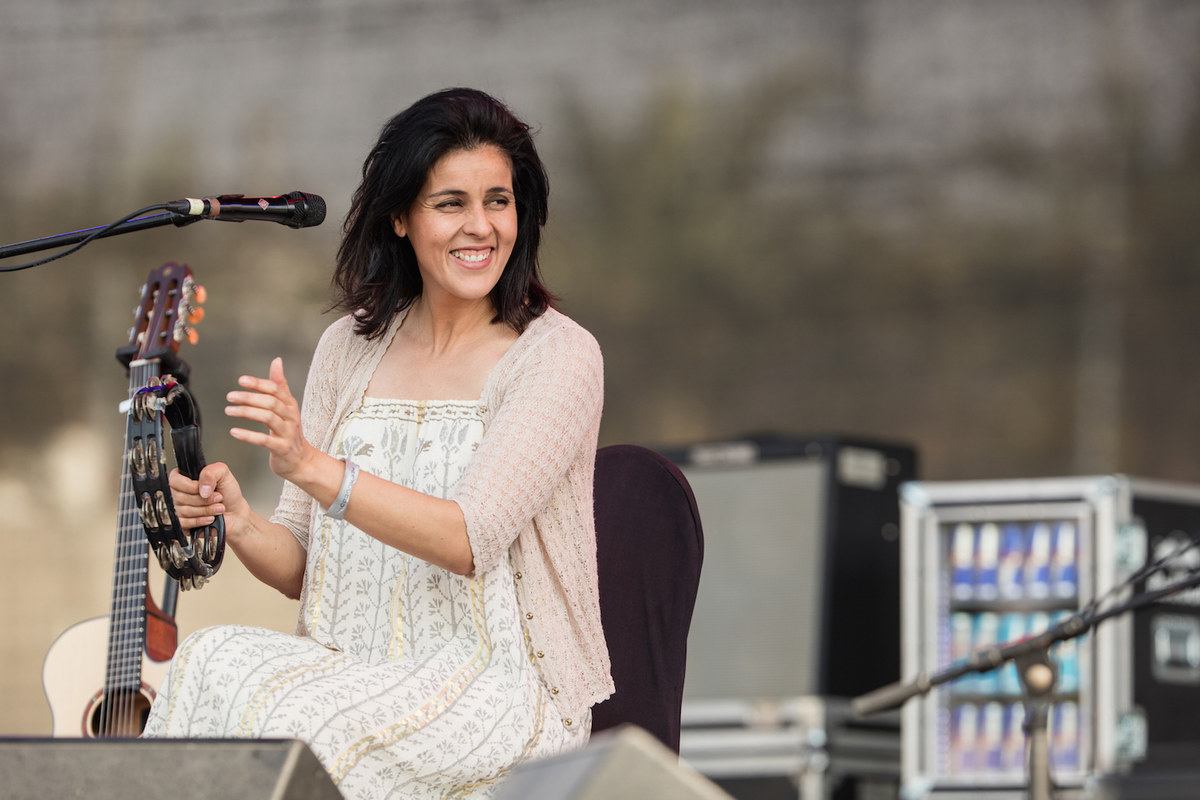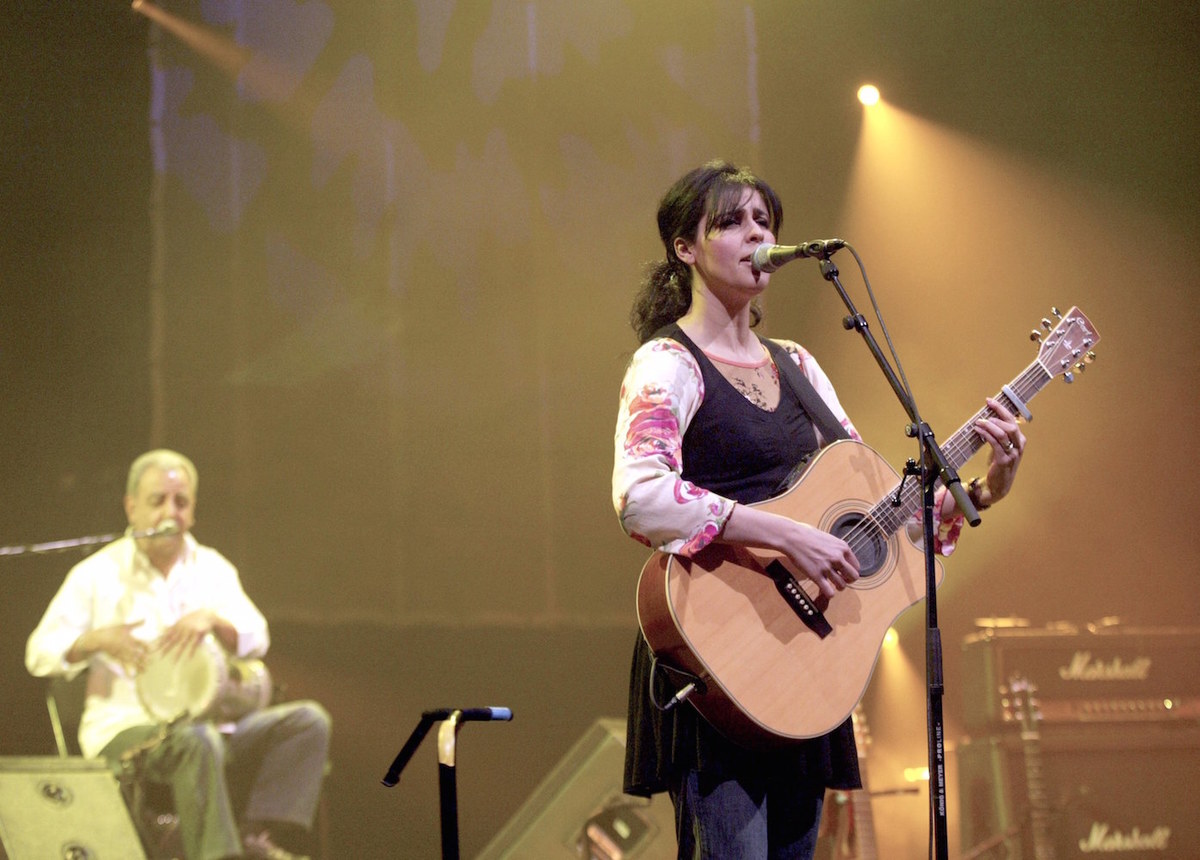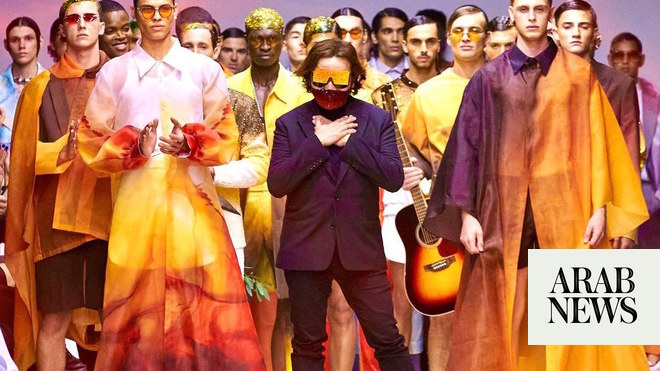French Algerian musical icon Souad Massi: ‘If we lose our humanity, we are lost’
DUBAI: In the darkest moments of the COVID-19 pandemic, Souad Massi would walk down to the river. The water inspired her, made her feel better about herself, helped her to reflect. It was there that she discovered Sequana, the goddess of the River Seine.
“It was a very strange and wonderful discovery for me,” says the Franco-Algerian singer-songwriter. “I didn’t know anything about her but she inspired me. She was a goddess of healing and that’s what I needed during COVID. That’s what we all needed, I think. I was impacted like a lot of people and we lived in fear in that moment and had time to reflect. So a lot of things inspired me in that moment.”
The Gallo-Roman deity would go on to not only lend her name to Massi’s new album, but its title track, too. In the latter she speaks directly to her two young daughters. “I wanted to tell them that life is beautiful, but it’s OK if you have problems, if you’re afraid of the future, if you don’t know what job you can do, or if you have difficulty communicating with other people,” explains Massi, who was born in Bab-el-Oued, a district of Algiers, and moved to Paris in 1999. “It’s very hard for them. So I asked Sequana if she could help me, give me courage. Because I want to give hope to my daughters.”
A collection of 11 songs, nine of which have been written by Massi, “Sequana” is the artist’s 10th studio album and an eclectic blend of genres and moods. Set for global release on October 14, the launch will be accompanied by a concert at Maraya in AlUla — Massi’s first performance in Saudi Arabia. She will also appear at London’s Barbican on October 29, cementing a stunning new chapter in her career.

Once a member of the Algiers-based hard rock group Atakor, Massi has built an enviable reputation for herself over the course of the past 20 or so years. Renowned for the powerful distinctiveness of her voice and the poetry of her lyrics, she released her first solo album, “Raoui,” back in 2001 and has been charming audiences across the world ever since.
In “Sequana,” she sings about the causes that are closest to her heart, whether they be love and exile or the importance of human relationships. In that sense the album is a continuation of what has always been Massi’s calling card — an unfailing determination to speak out for what she values the most.
“I talk about human connections, about the importance of empathy, the importance of love,” says Massi, apologizing for her broken English. “I understand that we are fragile, but if we lose our humanity we are lost.”
The first single from the album, “Dessine Moi Un Pays” (Draw Me a Country), came out in June and, although perhaps rooted in the loss of her own homeland, draws on the more recent displacements of people from Syria and Afghanistan. It is nature, however, that takes center stage in the album. In the press material that accompanies its release, Massi states that “what we must always maintain, whatever life brings our way, is our connection with nature, firstly for the beauty it offers, but also for its mastery in the art of resilience.”
The album’s cover also features Massi with two daisies delicately placed over her eyelids, representing what she says is a symbol of resistance. “This earth is beautiful and I want to stand with those people who try to protect it and fight for it,” she says simply.
The musical palette that accompanies these themes is broad. Massi is known for her generous embrace of musical styles, incorporating rock and chaabi into an otherwise acoustic sound. On “Sequana,” she has branched out further, adding calypso, chanson and bossa nova to the musical traditions of her native North Africa. In doing so, she has created an often-hypnotic blend of genres, thanks in no small part to the English producer Justin Adams. Having worked with the likes of Rachid Taha, Juldeh Camara, Tinariwen and Robert Plant, Adams is no stranger to the world of successful global collaborations.
The album’s opener, “Dessine Moi Un Pays,” features Kabyle-style acoustic guitar, a violin quartet, and the Syrian flautist Naïssam Jalal. Elsewhere, the mandole (an Algerian steel-stringed instrument akin to the mandolin) helps to transform “Dib El Raba” into a joyful mid-tempo groove. Other collaborators in what is an entirely new musical line-up for Massi include the English singer Piers Faccini and the singer-songwriter Michel Françoise, who wrote the lyrics for both “Une Seule Etoile” (A Single Star) and “L’espoir” (Hope).
“You know, I grew up in Algeria and was at the crossroads of Africa, Europe and the Middle East,” says Massi, who listened to chaabi and the songs of the Kabyle (a Berber ethnic group) growing up. “We were really at the center of it all and that was really interesting for me as an artist, because I heard all this music and I travelled a lot and met a lot of people. So when Justin and I spoke about my songs, the lyrics and my inspiration, he told me to be natural and to follow my instinct. So it was simple. I can play traditional music, I can play rock music, I have a classical base, so why would I limit myself? I don’t want to limit myself. I want to be free like I am in my life and I want to translate this in my music.”
Folk music and the guitar — two hallmarks of Massi’s sound — remain a central component of “Sequana.” It is they, she says, that provide the kind of intelligence required to transform pain into song and feature prominently on both “Sequana” and “Dib El Raba.”

“Folk music was my first love and I’m one of those people who need a story, who need to understand, who need to live a song with its lyrics,” says Massi, an admirer of Bob Dylan and Joan Baez. “The first folk songs were just one person with a guitar speaking about their pain, about the difficulties of life, of oppression, of heartbreak. Music was there to accompany what they wanted to say. And when the lyrics are rich and true, that’s when music is at its most powerful.”
Nowhere is this truer than with the Chilean folk singer Victor Jara, to whom Massi has dedicated the album’s final song. Inspired by the folk traditions of his homeland and by singer-songwriters such as Violeta Parra, Jara wrote songs of protest that advocated political reform and social justice. He was tortured and executed by the regime of Augusto Pinochet in 1973.
“I love this man who died for freedom and I have a lot of respect for him. When I discovered his life and the story of his death, I was very sad, but I wanted to transform this sadness into something real. I have a lot of respect for people who are generous, who don’t care about their life, who are gentle, who think about others, who give their life for us,” she says. “Because freedom is a gift to others. People like Victor Jara give us this gift.”

